- Home
- J. R. Ellis
The Body in the Dales Page 12
The Body in the Dales Read online
Page 12
Baxter opened these doors as the room was a little stuffy and stepped outside. There was an eerie silence in the late summer evening and, looking up, he saw the black fluttering shape of a bat outlined against the fading light. He paused to take in the view and then returned to the sitting room. He sat in a large low leather sofa, took the phone and dialled the number.
Oldroyd had finished his ravioli and was sipping his coffee and gazing at the unusual décor. The restaurant was a converted music hall and the proscenium arch was still there. The tables higher up were on what would have been the stage. He was just trying to imagine some Edwardian music hall artistes performing up there when his phone rang.
‘Hello, Chief Inspector Oldroyd.’
‘Oh, hello, er, my name is John Baxter I’m ringing from Burnthwaite.’ The voice sounded hesitant and a little afraid.
‘Yes.’ Oldroyd tried to be encouraging.
‘You won’t remember me but I was there on Monday when Dave Atkins’s body was brought out of Jingling Pot. I was one of the rescue team who helped to bring him up.’
‘Yes.’
‘You’re in charge of the investigation aren’t you?’
‘That’s right.’
‘Well.’ There was a long pause. ‘I think I can help you.’
‘OK.’
‘You see I’m pretty sure I know who did it and how the body came to be where it was.’
Oldroyd sat upright and immediately forgot about music hall artistes.
‘You do, but how?’
‘Yes,’ the voice cut in, ‘but I can’t tell you over the phone. It’s just that there’s a bit too much to explain as to how I know who it is, I mean, if I do. I can’t be completely sure and I know you’ll understand that I can’t explain it over the phone,’ he repeated, sounding rather agitated.
‘Yes, I do understand. Look, give me your address and I’ll be in Burnthwaite in half an hour.’
Baxter put the phone down with relief. He blew out air to release his tension and went to the kitchen to pour himself a beer. He returned and switched on the computer; there was something he wanted to check before the chief inspector arrived, although he was pretty sure of his facts.
He had just located the site he was looking for when he heard a loud crash from his garage workshop, located through a door from the kitchen. His immediate thought was burglars. There had been a spate of break-ins in the area recently. Without further pause he unlocked the door and entered the workshop. It was dark inside, and he reached for the switch and pressed it, but no light came on. In the light from the kitchen he could make out a box of tools upended on the floor, the contents scattered.
The step he took towards the toolbox was his last. He hadn’t seen that the cable from the light switch had been cut and he didn’t realise that the toolbox had been deliberately dropped to make the crashing noise which lured him to his death; a death which was administered by a savage hammer blow to the back of the head, very similar to the one that had killed Dave Atkins.
Four
If tha slips and slides on t’Devil’s Cup,
That monstrous ’ole will eat tha up.
Oldroyd was looking down at the body of John Baxter when Andy and Steph arrived. They’d not been long back in Harrogate when the call had come to return to Burnthwaite.
The lanky figure of Tim Groves was stooping over the body like a question mark. Oldroyd was crouched down beside him examining the head wound from which blood had trickled across the concrete floor. They were so engrossed that neither man acknowledged the arrival of the others. The scene had been sealed and a PC was keeping a log of who went in and out.
‘Head smashed in by the famous blunt instrument, Jim,’ pronounced Groves. ‘Very possibly the same blunt instrument as the one which finished off our poor friend in the pothole.’
His long, sensitive fingers in their thin plastic gloves felt around in the blood-matted hair of the head and into the nasty depression in the skull, which was leaking blood and brain matter. The body lay crumpled on the floor of the garage in a way very similar to the body in the CSI’s photographs of Jingling Pot. Strange, thought Oldroyd, as he had many times before, how quickly and irrevocably death could strike. He had been talking to this man only hours before and now he was reduced to a mass of flesh: a carcass, inert and no longer human. It was not an idea he liked, so again he brought his mind back to the situation.
‘I’ve no doubt you’re right,’ said Oldroyd. ‘Our killer has struck again.’ He was suddenly aware of the presence of the newcomers. ‘Ah, come on, you two, look at this.’
‘You seem to be well on with things, sir,’ said Carter, also looking down at the body.
‘Yes, Carter, Tim lives here in the dale not far away so I was soon able to get him here. The victim’s only been dead a couple of hours.’
Steph looked puzzled.
‘How come you were here so quickly, sir? What happened?’
Oldroyd moved away from the body, stepping over a congealing pool of blood and the tools scattered over the floor.
‘I was already on my way here. This unfortunate chap phoned me and asked me to come straight over. Said he knew about the murder of Atkins.’
‘Obviously he did, sir.’ Steph moved around the room to view the body.
‘Indeed. In fact he told me he knew what had happened, how the body had ended up in the pothole, but he wouldn’t tell me over the phone.’
Carter whistled.
‘So you arrived here to find the body?’
‘I did; someone beat me to it and you can bet your life that that person is the one we’re already looking for.’
‘How did the killer know that this bloke was about to spill the beans?’
‘Difficult to be sure but I suspect that they were already suspicious for some reason and probably tracking him. It’s our bad luck that they decided to move in just before he got to us.’
‘Who is he anyway, sir?’ asked Steph.
‘He told me his name was John Baxter and you and I have met him, Andy.’
Carter glanced down at what could be seen of the face.
‘I don’t recognise him, sir.’
‘He said he was there at Jingling Pot when Atkins was brought out. In fact, he was part of the team that did it. I don’t recall him either but he must have been one of those who didn’t say much. He was probably already beginning to piece together what had happened but didn’t feel he could say anything. You don’t go around accusing people of murder without being pretty certain of your ground. Maybe the murderer was actually there. He told me over the phone that he couldn’t be absolutely sure. He must have been agonising since that day about whether or not to come forward.’
‘Poor sod,’ said Carter. ‘Just a bit longer and he would have been safe.’
‘Yep.’ Oldroyd sighed. ‘I’m afraid it’s another MTAP.’
‘A what, sir?’
‘Malignancy of time and place,’ replied Steph. ‘One of Sir’s acronyms.’
‘Well remembered, Steph.’ Oldroyd turned to Carter. ‘I like to create a few of my own acronyms to counter the idiotic ones that come from the morons that spout management speak. At least mine have some practical meaning. This one refers to the reality of so many murders: that the fate of the victim depended on being in the wrong place at the wrong time or acting in the wrong way at the wrong time. Think how many unfortunate victims of serial killers just happened to present an opportunity to the killer without knowing it.’
‘But he must have known the killer, sir.’
‘Yes, but here the malignancy lies in the fact that he didn’t speak out earlier before the killer got to him. He’s had since yesterday morning but only decided when it was too late.’
Oldroyd paused. He often mused on the ironies of time and place. Did the lucky accidents in life balance the unlucky ones or was fate governed by a Hardyesque malignity? Maybe the victim lying on the floor now in a pool of his own blood refused when he was seventeen to g
et in a car that later crashed. It was one of the many intractable mysteries of life that circled around the main one: death itself.
‘Better rouse the neighbourhood, you two, and see if anybody saw or heard anything suspicious. But before you do, come and look at this.’
He led Carter and Johnson to the living room and the computer, which was still switched on.
‘He must have been looking at this when the killer arrived. What do you make of it?’
Carter looked at the screen to see weather reports for the area. There were columns of figures giving temperature, wind velocity, rainfall etc. for the Wharfedale area going back a couple of weeks. He shook his head.
‘Weather reports, sir? I don’t get it. Why would he be looking at them? Unless he was a weather nerd, you know: “The average temperature this month has been higher than for any August since 1935 and nobody gives a toss” kind of thing.’
‘Well, don’t be so dismissive of the weather, it can sometimes tell you some useful things,’ replied Oldroyd, who could be a bit of a weather nerd himself, ‘and I have an idea it could be an important clue here. I think he was checking things before I arrived.’
‘Checking the weather, sir?’ said an equally puzzled Steph.
‘The weather records,’ replied Oldroyd with emphasis on the last word, but would say no more.
Carter went to look around the workshop.
‘It’s pretty tidy in here, sir, apart from that box of tools scattered around. That must have made a hell of a racket if it fell off that shelf. I wonder if that’s how the murderer lured him in here?’
‘I would think you’re right, Andy. The killer was already in here, that’s for sure; got in through that small door at the back there, forced the lock.’
‘They must have known a bit about the layout of things; that there was a door there and another one from the house.’
‘Yes, all confirming that the killer knew him and had visited this place.’
There was the noise of vehicles drawing up outside.
‘This’ll be the SOCOs and probably Bob Craven too.’
Steph looked down at the body.
‘Does this take us any further, sir? I mean, we’re already pretty sure that the killer was a potholer. I suppose that must be confirmed now.’
‘If one potholer was killed because he knew too much about the circumstances of the murder, it is reasonable to assume that what he knew was something to do with the caves. And that would also be known by another potholer who is the murderer.’
Carter followed the logic, but was still sceptical.
‘Are you sure he was telling the truth when he called, sir? I mean, how do you know that he wasn’t an accomplice who got scared and wanted to rat on his mate?’
‘I can’t be sure, and Steph’s right: it doesn’t tell us very much more than we know because we’ll probably find that most of the caving fraternity knew this poor bloke, so it hardly narrows it down much. It still leaves us with plenty of suspects.’
‘Right Jim, I’ve finished.’ Tim Groves was removing his rubber gloves. ‘I’ll send the report as soon as I can; doesn’t sound as if it will be much help; cause of death obvious and you have a pretty good idea of the time of death already.’
‘Still need to have it confirmed, Tim, you never know on a case like this; something unusual is always likely to happen.’
Tim Groves left and Oldroyd sighed.
‘Come on, we’d better get back too. I need to get ready for the media. We can’t keep away from their friendly embrace for much longer after this.’
As Burnthwaite was about to learn of its second murder within a matter of days, Geoff Whitaker returned to work in the kitchens of the Red Horse. This was not a particularly stressful prospect as, to be honest, he’d been producing the dishes on the menu for so long that he could do it almost blindfolded. It was the standard stuff of pub cuisine: steak-and-kidney pie, battered haddock with Yorkshire mushy peas, lamb Henry, roast beef, vegetarian lasagne, pork casserole with peppers, various filled baguettes with chips. The monotony was broken by the daily specials: today it was Cumberland sausage in onion gravy with mustard mash, and fish pie with salmon and prawns. Not a great deal to tax his culinary skills there. Nevertheless, he enjoyed his job as a chef. The issue was money: it didn’t pay well and he was always a bit short.
This problem was compounded by his fondness for a little online gambling. In truth, a little would have been OK, but as with all addictive activities, a little soon became a little more and so on. As with all gamblers who are genuinely hooked, the illusion of huge gains that never actually materialised became compulsive. The losses mounted up, all to be wiped out when the big win came . . . and so on.
Helen was aware of his gambling. They’d had a serious discussion about it that had ended with him promising to kick the habit that was now damaging his family. The thing that had affected him most deeply was not having enough money to buy the kids what they wanted for Christmas.
Everything had been fine for a while, but, like an ex-smoker who starts to drag furtively on an illicit cigarette, he had quietly slipped back on to the fatal websites where the temptation was too much to bear. He was now well and truly hooked again, but this time it was all in secret. Even worse, his losses had led to him becoming involved in things he now regretted.
He entered round the back of the pub through a grubby doorway next to the bottle bank and rubbish bins. People were already at work in the kitchen. One or two looked up and he received some muttered ‘Hi’s in greeting, but he felt a tension in the atmosphere. Did people find it too ghoulish to talk to someone who had stumbled on a murder victim? Maybe there was a suspicion that somehow if you found a body you might have had something to do with it. Only Penny, a young sous chef, came over and quietly asked him if he was OK.
‘Yeah, fine. I suppose.’
‘Can’t have been much fun, finding a body like that.’
‘No, especially when you know them.’
‘I know; God, that must have been awful.’
‘I’ve had better trips underground.’
He’d been putting on his working clothes and apron while he was talking. ‘Anyway, better get on. I’m late.’
He was glad that people would think he was not himself because of his experience in Jingling Pot. The truth was that other things were on his mind.
He began to assemble the prepared ingredients for the lasagne, trying to concentrate on what he was doing, but after a few minutes he looked around the kitchen and checked that everyone was working. He slipped back out unnoticed to where he had come in and stood behind the bottle bank. He called a number on his phone. He was expecting the usual recorded message, but this time there was an answer. Whitaker looked round sharply, checking there was no one in hearing distance.
‘Where the hell have you been?’ he hissed.
As he listened to the reply, his face contorted with contempt.
‘Needed to get away! Wouldn’t we all bloody like to, but there is no getting away from it, you bastard; you’re in this too!’
Whitaker began to pace around, trying to avoid the shards of broken glass as he listened to another reply.
‘Well, that’s pointless now, isn’t it? Because the police will be on to it soon so there’s no point running away and . . .’
He suddenly pulled the phone away from his ear and jabbed at it with his thumb.
‘Bastard!’ he shouted, but then stuffed the phone in his pocket and glanced nervously at the door. He stalked back to the kitchen, kicking an empty wine bottle against the wall in his frustration.
The next case meeting at West Riding Police HQ found Oldroyd and his team under much greater pressure.
‘I’m expecting the super to call me at any moment,’ confessed Oldroyd. ‘It’s all over the press now.’
On the table were some of that morning’s tabloids with lurid headlines: ‘Is There a Serial Killer in This Idyllic Village?’ over pictures of Burnthwaite wi
th insets of photographs of Atkins and Baxter. ‘Caving Community Rocked by Second Murder’ screamed another headline, followed by ‘A second caver was found brutally murdered last night only days after the body of local man David Atkins was discovered in Jingling Pot, one of the most popular potholes with experienced cavers.’
Carter frowned, picked up one of the papers and scanned the article.
‘“A spokesperson for West Riding Police said investigations were ongoing.” We can’t hide behind a statement like that for much longer, can we, sir?’
‘No. I’ve arranged a press conference for this afternoon. I’ll have to throw them something to feed on. You come along; it’ll be a good introduction to the local media circus.’
Carter was not intimidated by this, being familiar with the relentless media scrutiny placed upon the Met.
The telephone rang sharply. Curious, thought Oldroyd as he picked up the receiver, how we ascribe a voice to the telephone depending on who we think is calling. This would almost certainly be Tom Walker. It was; the conversation was fairly brief.
‘Ah, Jim.’
‘Tom.’
‘It’s a bad do, this caver business, now isn’t it? Have you seen the papers?’
‘Yes, I’m having a conference this afternoon.’
‘Good man. Are you getting anywhere with it?’
‘It’s not long since we spoke, Tom. The first bloke was really unpopular, but we’re narrowing the list of suspects down. The second bloke called me just before he was done in. He was going to tell me who he thought did it. I was on my way over there.’
‘Bloody hell, that’s bad luck; killer got to him before you did. Keep that away from the bloody hacks; it’s just the kind of thing they like: “Killer Outwits Police” and rubbish like that.’
‘I know. Only my team and Tim Groves know what happened.’
‘OK. Well, they’re good people, but tell them to keep their mouths shut. You know Burnthwaite’s in Archibald Ramsay’s constituency. That little Tory bastard will be bleating to the Home Secretary that the crime investigation’s damaging the tourist economy; can’t the police ensure the safety of his tax-paying constituents etc. etc. Then the Home Secretary will be on to Watkins and he’ll carpet me.’

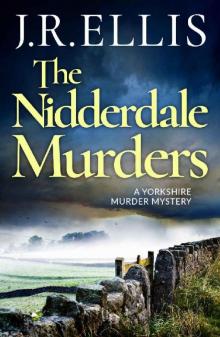 The Nidderdale Murders (A Yorkshire Murder Mystery)
The Nidderdale Murders (A Yorkshire Murder Mystery)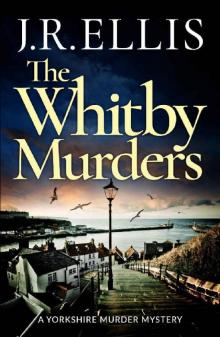 The Whitby Murders (A Yorkshire Murder Mystery)
The Whitby Murders (A Yorkshire Murder Mystery)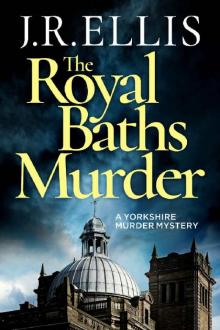 The Royal Baths Murder
The Royal Baths Murder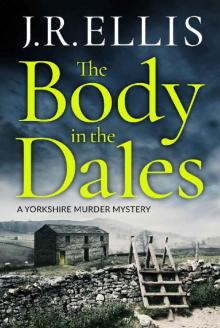 The Body in the Dales
The Body in the Dales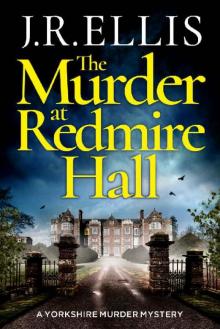 The Murder at Redmire Hall
The Murder at Redmire Hall